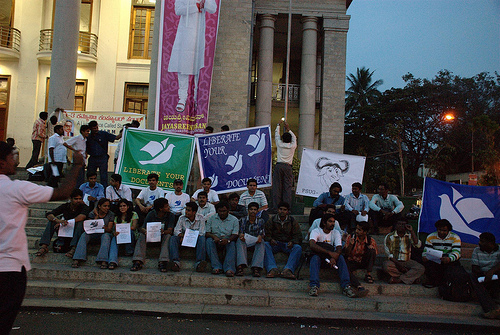

From the Campaign for Document Freedom
SOFTWARE patents are truly a menace. Virtually no software developers would ever defend these, except maybe their 'pioneer'. These are hurting even proprietary software companies, not just Free software developers. As the Microsoft booster Tim Anderson put it yesterday, "[l]egal woes (and cracked licence keys) cause dev favourites to throw in the towel". He wrote about "Iron Speed, a firm which provided a rapid application development tool for creating .NET apps [which] is shuttering itself thanks to "litigation with a patent troll", according to a letter sent to customers by co-founder and chairman Alan Fisher."
"The fight against software patents ought to be a common cause among proprietary and Free/Open Source software developers."India's policy on algorithm monopolies has been sound for a number of years, especially given the large number of software developers in India (both proprietary and Free/Open Source software developers). We were therefore rather stunned to learn that India is making a terrible, suicidal move. The Indian Patent Office sells out, causing huge issues for everyone, based on patent-centric sites. There is a panic among everyone except patent lawyers. Some rightly ask: "Will It Stifle Innovation in the IT Industry?"
Of course, it has been repeatedly shown in practice and in theory. India is making even more impact in the media (even international networks like Reuters [1, 2] by giving Pfizer the finger again. As PTI put it, "India rejects Pfizer's patent application for arthritis drug". Pfizer just wants another monopoly and India, realising the ethical impact, denies/declines. Why can't the Indian Patent Office realise that patents on software too are unethical, irrational, and damaging to India? Who is this patent office working for? As one site put it: "The Indian Patent Office (IPO) has addressed limitations on patents for computer-related inventions to clarify the Patents (Amendment) Act 2002."
It didn't just address limitations; the word "limitations" has a negative connotation, as if patent maximalism is a good thing.
"Free Software activists against changes to patent norms" is the headline of this new article in English, which shows that the Free software types are already responding to this crisis. To quote the opening paragraph: "The Free Software Movement of India (FSMI) has alleged that the new Guidelines for Examination of Computer Related Inventions are illogical. It argues that they violate the spirit and law contained in the amended Patents Act of 1970 and could pose a grave threat to innovation in our country."
There are meanwhile reports also from China, the other Asian technology giant. "Last year," said this article, "for the fourth year running, China topped the patent league with 928,000 patent applications compared to 578,800 patents filed in the USA."
This is not because of increased innovation but due to patent maximalism. As this new article indicates, software patents are becoming widespread in China (we wrote about this trend before). To quote the lawyers' site:
Patenting computer software inventions makes sense for the Chinese e-commerce industry for three reasons. First, the Chinese government wants more businesses to patent their technological innovations. This policy is supported at the national level and the central government pays for inventors to apply for patents. Second, e-commerce is very important in China. One quarter of all consumer purchases in China are done on-line. And that number is unlikely to get smaller. Third, today's Chinese consumers have many options and they have grown to expect quality products, quick service and reasonable prices.
For most active businesses, the third reason is the key. Finding an edge in meeting those consumer expectations has made for a fiercely competitive marketplace. Protecting process innovations that involve software improvements is, as it is everywhere, problematic. How are computer software inventions protected in China as a matter of law?